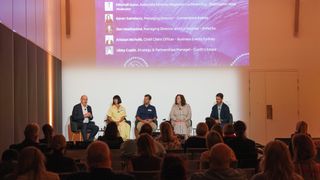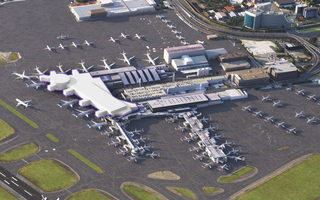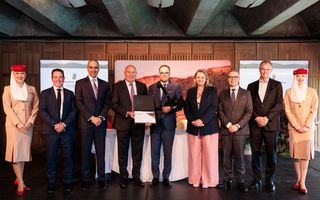The growth opportunity provided by business events and corporate travel was the focus of a panel discussion at the 2024 NSW Visitor Economy Forum.
Panellists included BESydney Chief Client Officer Kristian Nicholls, Professional Conference Organiser Association councillor Karen Sainsbury, Enperso Managing Director Dan Heathwood and Cupitt’s Winery Strategic Partnerships Manager Libby Cupitt.
The panel event was moderated by Destination NSW Associate Director, Regional Conferencing Mitchell Gunn and explored the needs of business event decision makers, delegates and corporate travellers, strategic sales and marketing, the rise of delegates mixing business and leisure (‘bleisure’) and how destination stakeholders and operators can get involved.
Business events are important contributors to the NSW visitor economy. They attract high-yield domestic and international travellers to the state, often during mid-week and off-peak periods. These high-yield travellers also spend more than the average visitor on accommodation, food, services and experiences during their trips.
Domestic overnight conference visitors to NSW spend on average $548 per night, which is 139.7 per cent higher than domestic leisure visitors spend per night ($228).
In the year ending June 2024, Sydney welcomed 3.1 million domestic overnight business visitors, who stayed 7.8 million nights and spent $2.9 billion.
Sydney also welcomed 340,500 international overnight business visitors, who stayed 3.3 million nights and spent $757 million during their visit.
The average domestic overnight conference visitor to NSW spends $548 a night, which is 139.7 per cent higher than domestic leisure visitors spend per night ($228).
Ms Sainsbury said the opening of Western Sydney International Airport offered transformational opportunities for the business events sector.
“Advanced manufacturing will be a focus of the new aerotropolis – it’s time to start conversations with networks to understand the different scale and nature of events in the industry sector, build relationships and develop packages that suit targeted needs,” she said.
Mr Heathwood also advised building relationships with travel management companies to be part of the distribution network.
“Corporate travellers, in particular executives, are usually looking for ease in their booking experience,” he said.
View Destination NSW’s ‘Quick tips for working with the business events sector’ guide.
Rising interest in bleisure
According to Corporate Traveller more than two-thirds of business travellers take at least one bleisure trip per year, with 88 per cent of Australians and New Zealanders saying their employer allowed them to mix business with leisure on trips.
Recent findings include:
- Female business travellers are more likely to take bleisure trips
- Younger travellers are more likely to take bleisure trips. For those aged 20 to 25, the rate was close to 15 per cent
- The greater the distance for travel, the greater the likelihood of bleisure travel
- Millennials preferred bleisure trips that allowed for sightseeing and exploration
- Older travellers preferred using the time to visit friends and family
A report released by YouGov identified the key trends shaping the bleisure landscape in the Asia Pacific:
- A growing appetite for exploration: Nearly 7 in 10 business travellers in the region are extending their work trips for leisure. India leads the pack with a staggering 77 per cent.
- Diverse accommodation preferences: While standard hotels remain popular, the demand for unique stays is on the rise, with serviced apartments a top choice in Australia.
- Nature and city escapes: Bleisure travellers in the Asia Pacific have diverse interests, from bustling cities to the great outdoors of Australia.
- A lucrative demographic: The majority of bleisure travellers in the Asia Pacific belong to the affluent 45-64 age group, presenting a significant opportunity for businesses catering to this segment.



